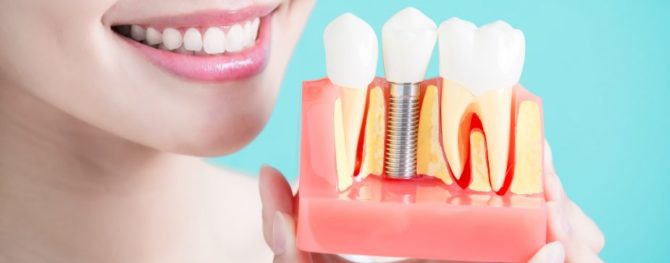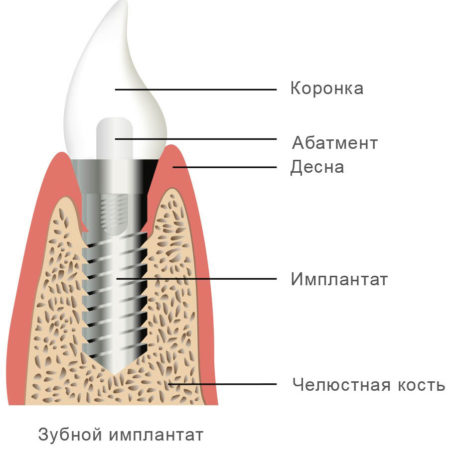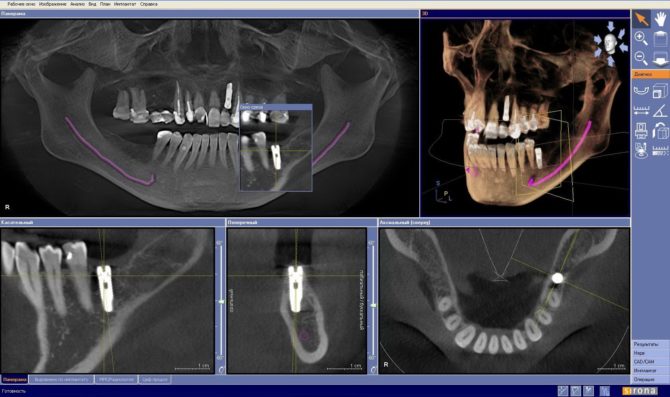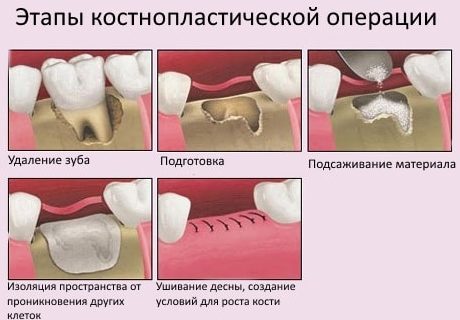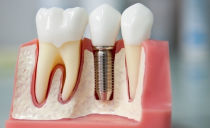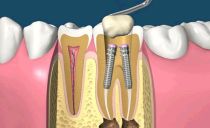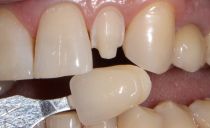How much does it cost to insert one tooth implant
It often depends on how much it costs to put a tooth implant, a person will go for implantation or will be limited to removable prosthetics. But this figure cannot be specific, since many parameters influence it.
Content
- What determines the cost of implantation
- What is an implant in dentistry
- Preliminary diagnosis before implantation
- Contraindications for dental implants
- Remediation and preparation of the oral cavity for implantation
- Description of the dental implant procedure
- Implant placement techniques and their cost
- Types of implants in dentistry
- Where is it cheaper to put dental implants?
What determines the cost of implantation
The parameters on which implantation prices depend include:
- implant manufacturing country;
- region in which the operation is planned;
- rating and prestige of the company;
- cross-sectional shape and thread of the implant;
- the chosen method of installing the prosthesis;
- material quality.
What is an implant in dentistry
An implant is a fixed prosthesis that is placed in the absence of a tooth. It imitates a tooth root and consists of:
- implant;
- crowns;
- an abutment that connects the implant and crown.
The implant is almost an eternal design, since it does not require replacement. Only the crown changes, the artificial tooth root can be inserted once and for all.
Preliminary diagnosis before implantation
To place a tooth implant, you must consult a dentist. Depending on the chosen dental clinic, this procedure may be paid or free.
Then begins the stage of diagnosis, implying the identification of indications and contraindications for this method of prosthetics. It includes the first therapeutic examination of the oral cavity, the collection of biological fluids for analysis, computed tomography and radiography. Based on the images obtained, the doctor determines the height, volume and quality of bone tissue, and also identifies pathologies that may interfere with the insertion of the prosthesis. The more preliminary studies you have to do, the more expensive the work of an implantologist will cost.
Analysis collection
Each clinic has an individual pre-implantation preparation plan, but it always includes the following list of tests:
- general blood test, with which you can detect the presence of inflammatory processes in the body;
- blood glucose analysis (relevant for patients with diabetes mellitus);
- allergological tests, mandatory before any prostheses;
- general urine analysis;
- hormonal studies (especially for women);
- determination of the state of the homeostasis system.
CT scan
It is impossible to start the implantation procedure without computed tomography data, since there is a great risk of serious harm to health. Moreover, this examination should be carried out in a specialized dental center. This is due to the fact that special dental programs, individual cross-sectional configuration and high resolution will be required.
Orthopantomogram
An orthopantomogram is a panoramic x-ray that shows both dentitions. In addition to the jaws, on it you can see the adjacent joints and sinuses. Without this picture, it is not practical to proceed with implantation, since it allows you to:
- determine the strength and volume of bone tissue;
- to study the condition and projection of the maxillary sinuses;
- become familiar with the features in the structure of dental roots.
Thanks to the orthopantomogram, implants are placed without the risk of damage to the maxillary sinuses and trigeminal nerve.
Additional specialist advice
Before prosthetics, consultations of narrow specialists are shown. Due to a prolonged absence of teeth, a person’s bite may have changed, so before implantation, he should consult an orthodontist who will determine the best location for an artificial tooth.
In addition, you need to undergo an examination by a cardiologist and make an electrocardiogram, even in the absence of pronounced cardiovascular pathologies.
Contraindications for dental implants
If the examination revealed absolute or relative contraindications to the implantation of an artificial tooth root, the doctor will suggest installing removable dentures. The classic contraindications to the procedure are:
- childhood;
- mental pathology;
- rheumatism;
- lupus erythematosus;
- diabetes mellitus (with elevated glucose levels);
- osteoporosis (softening of bone tissue);
- renal or liver failure;
- myocardial infarction;
- lactation and pregnancy;
- inflammatory processes in the oral cavity (until they are eliminated);
- bruxism (relative contraindication).
If, when making diagnoses that are contraindications to implantation, a person continues to insist on surgery, he inserts artificial implants and teeth at his own risk, signing a document stating that there are no complaints to medical personnel. If the implanted prosthesis does not take root, the amount paid will not be refunded.
Remediation and preparation of the oral cavity for implantation
After the diagnosis, procedures are carried out to reorganize the oral cavity and eliminate various defects. In the presence of inflammatory processes in the mouth, the teeth do not implant, since there is a high risk that the prosthesis does not take root.
Preparatory actions performed before the installation of implants include:
- ultrasonic sanitation of the oral cavity - required;
- treatment of caries and pulpitis - if any;
- relief of periodontitis - if any;
- extraction of teeth and their fragments - if necessary;
- procedure for increasing the volume and restoration of the jaw bone - if the tooth was removed long ago, and the bone tissue managed to atrophy;
- staging a protective antibacterial membrane - during bone grafting.
Reconstruction of the oral cavity is a must for anyone who implants teeth. If you do not pass it, the prosthesis may not take root. How much are the procedures for implantation and rehabilitation of one or several teeth should be checked with your doctor. The prices of many medical centers are available on their official websites.
Some procedures shown before implantation can be completed as part of the compulsory medical insurance policy for free. But many clinics insist on preparing the oral cavity for implantation precisely with them, since in this case all actions will be carried out taking into account the features of the upcoming operation.
If the prices for dental implants are too high, it is better to look for a clinic with a lower cost of services. The main thing is to go through all the stages of prosthetics in one place.
Description of the dental implant procedure
A standard implant placement operation involves several steps. First, a dissection and exfoliation of the mucosal-periosteal flap is performed using a composter or scalpel. Then the surgeon must make a bone bed for the implant. This manipulation can be performed in different ways:
- by drilling with a drill at low speeds or manually;
- chisel;
- using a drill and chisel at the same time.
Dental implants are inserted into the finished bone bed, which can also be done in several ways:
- screwing in (if helical prostheses are used);
- driving in;
- through free placement.
After implantation, the surgeon closes the postoperative wound with a mucosal-periosteal flap and sutures. When using the composter, suturing is not performed; in this case, a normal base protective plate is placed on the wound.
Implant placement techniques and their cost
There are several ways to implant implants: classic, basal, laser. The most commonly used classical implantation technique, consisting of one or two stages. When used, the cost of installing an artificial tooth is equal to the price of the implant.
Installing implants using basal technology is cheaper. It does not provide for restoration of bone alveolar tissue, due to which the cost of such implantation drops to 7-10 thousand rubles. One-stage implantation cannot be used for older people.
With mini-implantation, an artificial root is implanted in the intra-gingival grooves. The cost of installing one implant in this case is low, but for high-quality fixation, at least 4 prostheses are required, so the total turnkey surgery budget is about 30 thousand rubles.
Laser implantation involves the surgical treatment of gingival and maxillary tissues with a laser. Its advantage is that the gums and periodontium regenerate well, and the prosthesis quickly takes root (less than 6 months). Using a laser reduces the likelihood of infection spreading throughout the body. This method of implanting an artificial tooth root is the most expensive. But no matter how much the laser implantation of 1 tooth costs, it remains the most effective and safest.
Types of implants in dentistry
The amount of implantation of 1 tooth will be affected by the type of prosthesis chosen. The following implants are distinguished:
- intraosseous, subdivided into lamellar (they are inserted if the bone is too narrow) and root-shaped (helical, cylindrical, combined);
- subperiosteal;
- transosseous.
Materials used in implantology
The cost of a tooth implant depends on how much the material from which it is made is worth. Often 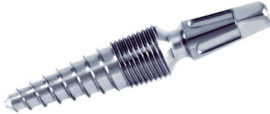 titanium is used to produce such prostheses because it is well implanted in bone tissue and is relatively inexpensive. The prices for titanium implants are ambiguous and depend on the quality of the material, production technology and spraying features.
titanium is used to produce such prostheses because it is well implanted in bone tissue and is relatively inexpensive. The prices for titanium implants are ambiguous and depend on the quality of the material, production technology and spraying features.
To save money, you can insert a ceramic or glassy carbon implant of the tooth, but how much it will stand is not known, since such designs are short-lived.
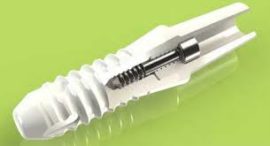 If you are allergic to titanium and want to establish the highest quality prosthesis, gold and zirconium (from zirconia) implants are used. They are about two times more expensive than titanium prostheses.
If you are allergic to titanium and want to establish the highest quality prosthesis, gold and zirconium (from zirconia) implants are used. They are about two times more expensive than titanium prostheses.
When replacing false teeth, the recommendations of the attending dentist should be followed. It is also worth remembering that structures with a porous surface, with thread and without polishing take root better than all others. When choosing the connection between the implant and the abutment, it is worthwhile to stay on the conical mount, as it provides the highest quality tightness.
Where is it cheaper to put dental implants?
Turnkey dental implantation in Moscow or St. Petersburg cannot be cheap. However, it is not so important how much an implant of one tooth costs when it comes to health. It must be understood that an artificial tooth root is placed in the jaw, so poor-quality work by a surgeon or a violation of implantation technology can lead not only to the spread of infection throughout the body, but also to jaw tissue necrosis. Therefore, if you don’t have enough funds for implantation of turnkey artificial teeth in a good dentistry clinic, it is better to install a removable denture.

